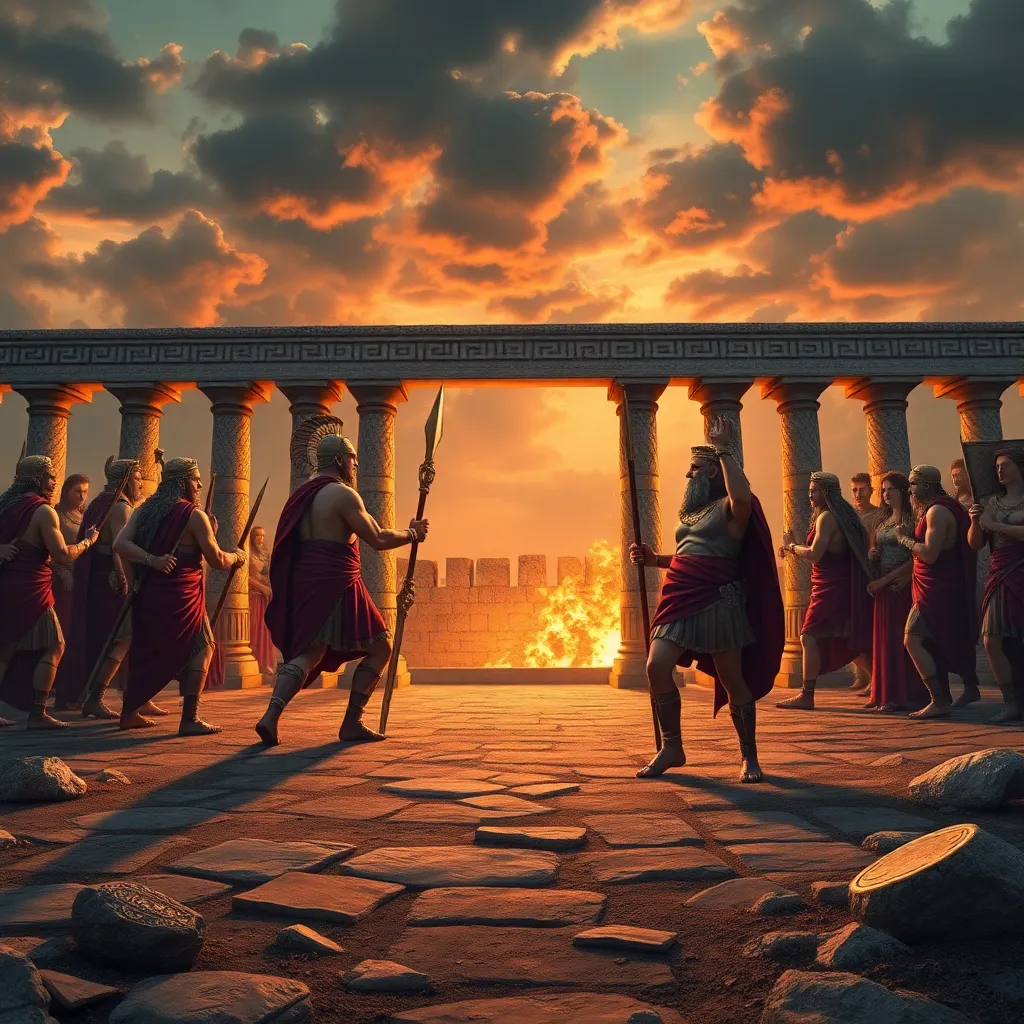The Trojan War: A Study of the Human Condition in Mythology
I. Introduction
The Trojan War, a monumental event in Greek mythology, is a story that has captivated audiences for millennia. It is not merely a tale of conflict but a rich tapestry of human emotion, ambition, and tragedy. The war serves as a cultural and literary touchstone, embodying the complexities of the human condition. In this article, we will explore the Trojan War through various lenses, including its historical context, the flawed heroes, the role of women, divine influence, and its lasting legacy in literature and art.
II. Historical Context of the Trojan War
The myths surrounding the Trojan War are diverse and intertwined with history. Traditionally said to have occurred in the late Bronze Age, the war features prominently in epic tales like Homer’s “Iliad.” However, the exact historical basis of the war is shrouded in mystery, leading to various interpretations.
Archaeological evidence, particularly at the site of Hisarlik in modern-day Turkey, suggests that a city resembling Troy did exist and faced destruction around the 12th century BCE. This has sparked debates among historians and archaeologists about the actual events that inspired the myths.
Oral tradition played a crucial role in shaping the narrative of the Trojan War. Stories were passed down through generations, evolving over time, which reflects the collective memory and cultural values of ancient Greek society.
III. The Heroes and Their Flaws
The Trojan War is populated by a cast of complex characters whose strengths are often overshadowed by their weaknesses. Key figures such as Achilles, Hector, Agamemnon, and Odysseus exemplify what it means to be human.
- Achilles: The greatest warrior of the Greeks, Achilles is driven by pride and rage. His hubris leads to devastating consequences, including the death of his closest companion, Patroclus.
- Hector: The noble prince of Troy, Hector embodies honor and duty. His vulnerability lies in his deep love for his family, which ultimately leads to his tragic downfall.
- Agamemnon: The commander of the Greek forces, Agamemnon’s pride and desire for power create conflict and strife, particularly with Achilles.
- Odysseus: Known for his cunning and intelligence, Odysseus faces moral dilemmas that reveal the complexity of human nature.
The concept of hubris, or excessive pride, permeates the narrative, illustrating the consequences of human flaws. These characters represent the struggles of pride, honor, and vulnerability, inviting readers to reflect on their own experiences and moral choices.
IV. The Role of Women in the Trojan War
Women in the Trojan War are portrayed in multifaceted roles, with characters like Helen, Andromache, and Cassandra embodying different aspects of femininity and influence.
- Helen: Often blamed for the war, Helen’s beauty and choice lead to immense suffering. Her character raises questions about agency and responsibility.
- Andromache: The devoted wife of Hector, Andromache represents loyalty and the personal costs of war, showcasing the emotional turmoil faced by women during conflict.
- Cassandra: Gifted with the power of prophecy but cursed not to be believed, Cassandra’s tragic fate underscores themes of knowledge, warning, and the often-unheeded truths in human affairs.
These female characters significantly influence the war’s outcome and illustrate themes of love, loyalty, and sacrifice, challenging traditional gender roles and expectations in ancient society.
V. The Influence of the Gods and Fate
The gods play a pivotal role in the Trojan War, intervening in human affairs and reflecting the complexities of human emotions. They embody various moral dilemmas, showcasing both support and opposition to the mortals involved.
The tension between free will and destiny is a central theme, as characters grapple with their fates while the gods manipulate events according to their whims. This dynamic raises questions about the nature of control and the extent to which individuals can shape their own destinies.
Ultimately, the gods serve as a mirror to human emotions—jealousy, love, vengeance, and compassion—highlighting the interplay between divine influence and human action.
VI. Themes of Honor, Revenge, and Justice
The cultural significance of honor in warrior society is a recurring theme throughout the Trojan War. Characters are often motivated by a desire to achieve glory and uphold their reputations.
The cycle of revenge is another critical aspect, as characters seek vengeance for perceived wrongs, leading to a cascade of violence and tragedy. This cycle impacts human relationships, creating a web of conflict that often results in further suffering.
Justice, as depicted in the aftermath of the war, is complex and multifaceted. The consequences of actions taken during the war often lead to discussions about morality, fairness, and the repercussions of one’s choices, reflecting the intricate nature of human society.
VII. The Legacy of the Trojan War in Literature and Art
The Trojan War has left an indelible mark on literature and art throughout history. Its influence can be seen in numerous works, including:
- Virgil’s “Aeneid”: This epic poem explores the aftermath of the war and the founding of Rome, intertwining themes of fate, duty, and the consequences of war.
- Shakespeare’s “Troilus and Cressida”: A complex exploration of love and honor set against the backdrop of the war, showcasing the human condition through the lens of tragedy and comedy.
Artistic representations of the Trojan War, from ancient pottery to modern films, continue to interpret and reinterpret the themes of the conflict, ensuring its relevance in contemporary storytelling.
VIII. Conclusion
In summary, the Trojan War offers profound insights into the human condition, revealing the complexities of pride, honor, love, and vengeance. Its enduring themes resonate with contemporary society, reflecting the timeless nature of human experience and emotion.
As we explore the narratives and characters of the Trojan War, we find a mirror reflecting our struggles and triumphs, reminding us of the universal truths that bind humanity across the ages.




